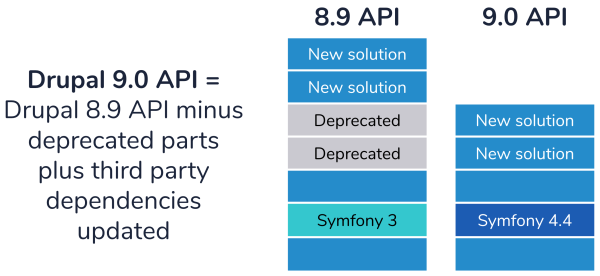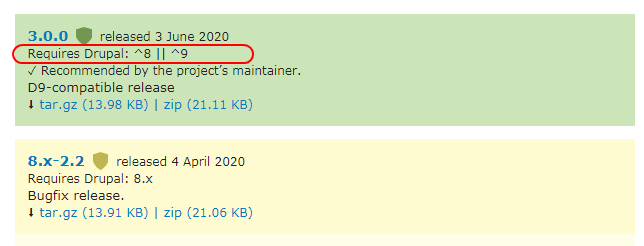English version was created automatically using Drupal module auto_node_translate and free DeepL translator.
Drupal 9 is here - what changes and news does it bring?
published on 2020-06-03
Drupal 9 is an evolution of the existing Drupal 8 series. In general, it does not bring any new functionality, but instead removes some components that have become unnecessary (Place Blocks and SimpleTest modules), or updates them to newer versions (Symfony 4, Twig 2 ...).
What's new in Drupal 9
Drupal 8 (specifically Drupal 8.0.0.) was released on November 19, 2015. Over the following years, new features were added to it in semi-annual (feature release) releases, while maintaining backward compatibility. Drupal 9 (9.0.0) is practically nothing more than the equivalent of Drupal 8.9.0 released on the same day, with two major differences:
- Old stuff (e.g. various core API functions) has been removed, which quite often is no longer supported e.g. by the current version of PHP https://www.drupal.org/node/3053107
- Third party libraries have been updated, e.g. Symfony 3 to 4.4 or Twig 1 to 2 https://www.drupal.org/node/3053116
- And of course there's a new logo :-)

Release notes for both versions are here:
- https://www.drupal.org/project/drupal/releases/8.9.0
- https://www.drupal.org/project/drupal/releases/9.0.0
As far as Drupal core is concerned, on the surface there is almost no visible difference. A clean install looks exactly the same, and few people will notice the missing Place Blocks (block_place )and SimpleTest modules.

https://www.drupal.org/docs/understanding-drupal/drupal-9-resources
Drupal 9 and Modules
The Drupal core itself offers decent options for building a site. However, up to contrib modules bring virtually limitless possibilities due to their incredible variability. Even with the release of Drupal 8, it was apparent that a lot of people were waiting to migrate from Drupal 7 until the necessary modules were available.
As mentioned, the big advantage is the near-identical versions of Drupal 8 and Drupal 9. For module developers, this means that unless they have been using some old Drupal API features, or maybe some old PHP, their Drupal 8 is compatible with Drupal 9, which is great!
Thanks to this, the version numbering of modules is gradually changing.
Differences between Drupal 8 and Drupal 9. For example, this module is version 8.x-2.2, where you can clearly see its intended use for Drupal 8. But the new version, which is both Drupal 8 and Drupal 9 compatible, already uses this new numbering.

Numbers of compatible modules
At the time of Drupal 9 release, the following number of modules existed:
- Drupal 9: 2,417 - as of release day zero
- Drupal 8: 8,984 - as of the November 2015 release
- Drupal 7: 14,522 - since release in January 2011
Personally, I think that's a sufficient number, because the difference between Drupal 8 and Drupal 9 means
- either little-used or abandoned modules,
- or modules that will be ready for Drupal 9 in the coming days
Is my site ready to upgrade to Drupal 9? The Upgrade Status module will advise you
If you want to know if your site is ready to upgrade to Drupal 9, just install this module (https://www.drupal.org/project/upgrade_status) to check your site. It will check for minimum PHP version, database ... and it will check installed modules (contrib and custom) as well. You can then see the complete status in a clear table.
Comparison of Drupal 8.9.0 and Drupal 9.0.0
| Drupal 8.9.0 | Drupal 9.0.0 | ||
|---|---|---|---|
| Installer ZIP package size | 30.2 MB | 26.97 MB | |
| Number of files, folders | 18,490 files, 5,447 folders | 17,977 files, 5,254 folders | |
| Number of core modules | 81 | 80 (only simpletest_uninstall() remains from simpletest ) | |
| Number of core themes | 7 | 8 (plus stable9) | |
| Number of core/assets/vendor | 19 | 15 | |
| default.settings.php | one commented out option |
Background
Drupal 9 is an evolutionary step in the Drupal cycle, it's not a sweeping change like Drupal 7 vs Drupal 8. Chances are you'll be able to upgrade to the 9 series on the first day of release. I expect that by the time 9.1.0 is released, even the minor issues found will have been fixed, and everyone will be able to upgrade.
So far, it seems that this strategy is paying off for Drupal, and we'll be upgrading to Drupal 10 just as smoothly in a few years.